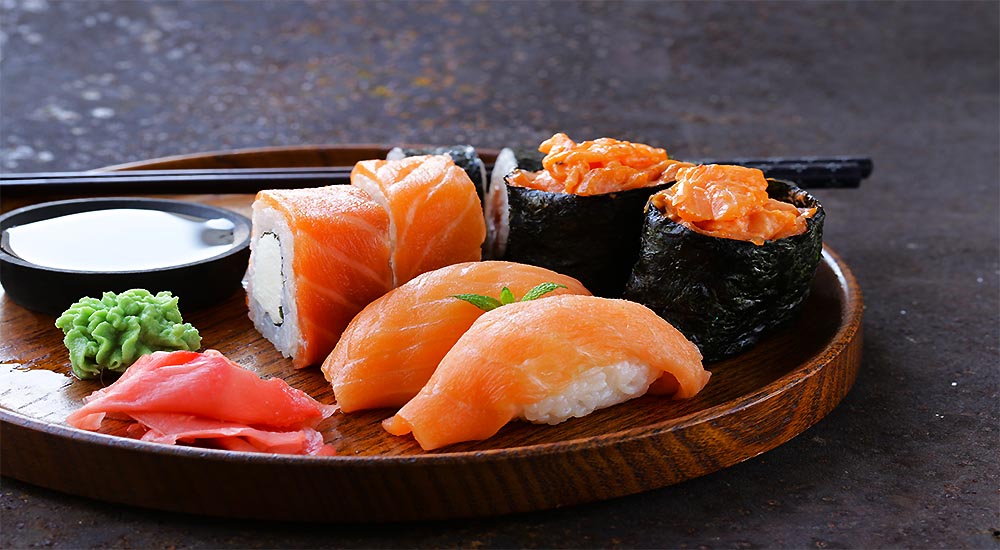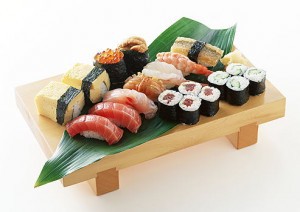Gluten Intolerance and Sushi – Is it a Safe Choice?

Is Sushi Safe for the Gluten Intolerant?
I was recently traveling and had to confront the dilemma of eating out for most of my meals. I found a great little smoothie place that was very gluten conscious and made me my green drink even better than I make it at home – stay tuned for that recipe.
Lunch was often a protein bar that I had brought with me from my office, but dinner, as those of us with gluten intolerance understand all too well, required some careful planning. We find Thai and Indian restaurants to be fairly safe bets but one evening we found ourselves with sushi as the only viable option. It made me realize that a newly diagnosed gluten-intolerant individual would look at sushi as a veritable “no brainer”. When you think of sushi you think of rice, seaweed, and fish – all safe right? Well, the answer is yes and no.
I think with some care and an English speaking waitperson you can do just fine, but there are things to consider and I wanted to share them with you to avoid any possible gluten contamination.
Is ‘Glutinous Rice’ Okay?
Sticky rice is what they use to make sushi. If you’ve eaten it you know why “sticky” is the perfect name for it. It is sometimes called glutinous rice because gluten gives something it’s gluey texture.
Don’t be confused between rice gluten and the gluten found in wheat, rye, and barley. They are entirely different. There is corn gluten also, but neither it nor rice gluten is a problem for those with gluten intolerance – cross-reactivity aside. (See my video for more on cross-reactive foods)
I know that’s confusing but once you learn the difference you’ll be fine. If you see “glutinous rice” on a label, just realize that they’re discussing the protein in rice and that it has nothing to do with wheat, rye, or barley.
The ‘Good, the Bad and the Ugly’ Unagi (eel)
Tempura (a wheat batter) rolls are frequently appearing on sushi menus. A piece of fish or a vegetable will be deep-fried in a batter and placed in a roll. Not only is this a gluten-containing product but it introduces the prospect of cross-contamination if your “innocent” gluten-free roll is being prepared on the same surface that just touched the tempura. I do recommend that you ask your waitperson to have the preparer use a clean board when preparing your sushi to avoid any cross-contamination.
Another problem is crab. Well, I should say “fake crab”. Real crab is fine but fake crab has gluten in it. You simply need to ask your server which type is being offered in their crab rolls. Typically the nicer the restaurant the more likely you are to receive the real thing. Roe (fish eggs) often top sushi and may have wheat as an ingredient. A safe bet is to ask for no sauce as that typically means soy sauce that contains wheat. If anything comes looking “brown”, ask if it was marinated or if a sauce was put on it. Albacore sashimi may come with a forbidden sauce that truly is “forbidden” for those of us with gluten intolerance.
Sometimes white fish are sprinkled with a gluten-containing substance and eel (unagi) often comes soaked in a sweet sauce that is definitely a bad idea when avoiding gluten.
Pure wasabi should be fine although some questions came up regarding “fake wasabi” that is not the pure root. Once again the quality of the restaurant can be a helpful guideline here.
Pickled ginger is pickled in rice vinegar so it should be no problem for someone with celiac disease or gluten sensitivity. Regular nori is fine as the only ingredient is seaweed. Kombu on the other hand is dried seaweed (pictured on the top left below wrapped around the egg – it is crispy) and may be cured in soy sauce or sake. You will need to ask to be sure.

Sushi Lovers Must Be Outspoken
To sum up, being shy and eating at a sushi restaurant is probably a recipe for disaster unless you’ve been a long time customer and they already know your needs and wants well. I have had patients who are sushi lovers say that they ask to sit at the bar so they can see their sushi being made. I think that’s an excellent idea.
Personally I eat very basic vegetarian rolls without sesame seeds that simply contain vegetables, rice, nori, and I’ve never had a problem. I was recently midway through my sushi when someone I was dining with commented that he heard that sticky rice had wheat in it. There’s nothing like that kind of comment to ruin one’s digestion! I promptly did the research contained herein and discovered it was the “glutinous rice” description that caused the false alarm for this gentleman.
Indigestion from stress aside, I’ve never had any trouble with the basic rolls I’ve eaten, and believe me, my body does let me know when it’s been contaminated. I hope you find this helpful. Avoiding gluten contamination in food when dining out can definitely be a struggle. There are many pitfalls but successfully navigating them is definitely possible and eating out doesn’t have to be a nightmare for those with gluten intolerance. Please let me know if you have any questions. I am here to help and would love to hear from you.
Do you need help with your health?
We have the diagnostic and testing tools, the clinical experience, and a different medical approach to discovering the root cause of why you have the symptoms that are bothering you. As long as you are ready to make some dietary and lifestyle changes, we can help you. We will "hold your hand" through the changes, step by step, to make each step an easy one. We are located in Clearwater, FL, at 1000 S Ft Harrison, at the corner of Ft. Harrison Ave. and Magnolia St. There is plenty of parking space directly accessible from Ft Harrison. If it is not convenient for you to come to Root Cause Medical Clinic, we offer telehealth/telemedicine consultations to residents of certain states. Call us for details.
Contact us for a Consultation – Call 727-335-0400

Dr. Vikki Petersen DC. CCN
Founder of Root Cause Medical Clinic
Certified Functional Medicine Practitioner
Dr Vikki Petersen is a public speaker, author of two books, several eBooks and creates cutting edge content for her YouTube community. Dr Vikki is committed to bringing Root Cause Medicine and its unique approach to restoring health naturally to the world.
Ask a Doctor
Have a health concern you'd like to speak with a doctor about? Or just want clarity on a subject? Ask Us!


